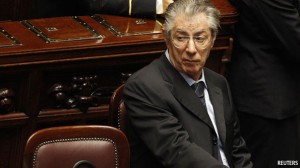 The Northern League, Luca Zaia remarked this week, should be “as transparent as a crystal”. Indeed. The party of which Mr Zaia, governor of the Veneto region, is a leading member has for years been loudly decrying the waste and corruption of southern Italy and the capital, Rome.
The Northern League, Luca Zaia remarked this week, should be “as transparent as a crystal”. Indeed. The party of which Mr Zaia, governor of the Veneto region, is a leading member has for years been loudly decrying the waste and corruption of southern Italy and the capital, Rome.
But this week accusations were made that, at the highest level, the accounts of the League itself were far from limpid. Police raided the party’s headquarters in Milan brandishing a warrant that accused its treasurer, Francesco Belsito, of running party finances in the “murkiest fashion” for the past eight years.
Milan’s chief prosecutor subsequently disclosed that Mr Belsito, who resigned his post, was formally under investigation on suspicion of fraud, embezzlement and money-laundering. He also said that Umberto Bossi, the League’s founder and chief, was not a suspect. Nor were any members of his family.
But the warrant also contained damaging allegations that taxpayers’ money paid to the League had been used to refurbish Mr Bossi’s house and pay for travel, meals and hotel accommodation for his children. Mr Belsito has denied wrongdoing. Mr Bossi and his son Renzo both denied all knowledge of the allegedly improper spending.
The claims are nevertheless potential political poison for the League’s charismatic, if at times eccentric, leader. As Roberto Maroni, the former interior minister and a senior member of the League, was quick to point out, this was not the first indication that something might be wrong with the way in which the party’s finances were being handled.
It was known that investigators were looking into why Mr Belsito had invested €7m of the League’s cash in funds based in Cyprus, Norway and Tanzania. Calls had been made within the party for his removal, and Mr Bossi had ignored them.
His position now looks precarious. Until last year, his autocratic management of his party was seldom contested. But then it had proved highly effective. Mr Bossi had coaxed the League’s share of the national vote up to more than 10% and given it a share in power as a coalition partner in all three of Silvio Berlusconi’s governments since 2001.
But Mr Bossi’s refusal to pull out of the last of those governments, despite claims of sexual indiscretion made against Mr Berlusconi and of financial impropriety made against some of his ministers, dismayed many of his followers. Last year, Mr Bossi faced unprecedentedly open criticism of his autocratic style of leadership from members of his party, many of whom felt the time had come for him to stand aside in favour of Mr Maroni.
The scandal also has implications for political stability in Italy, because since leaving government Mr Bossi has steered his party into opposition. The League has been far and away the most acerbic critic of the non-party, “technocratic” government of Mario Monti, who took Mr Berlusconi’s place as prime minister last November. Not only Mr Monti’s government, but the three big parties that back it, stand to benefit from the League’s discomfort.
With a general election due in spring 2013, that could make a difference. And Mr Bossi at least clearly feels that the scandal and the forthcoming vote are linked. “It seems to me that the next election campaign has begun,” he said today.
source – The Economist